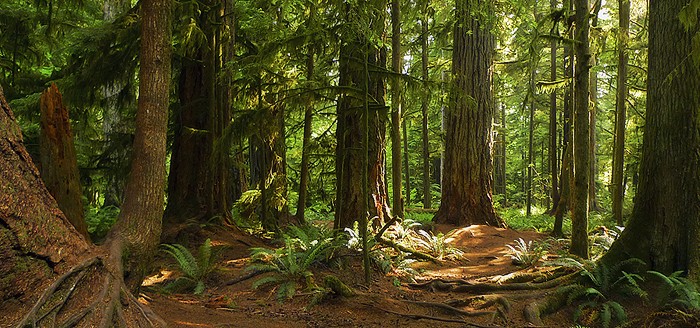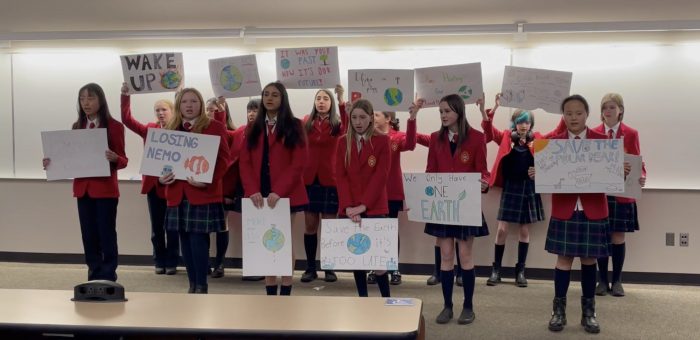Community Blog
How can BC’s environmental organizations be more effective?
I’ve commented before that I’m thrilled with the outcome of the 2024 BC Provincial election that gave the BC NDP a razor thin majority. With 47 seats compared to 44 held by the BC Conservatives and two by the BC Greens, David Eby and the BC NDP have been sent a strong message. British Columbians have rejected ideological-driven activism, empty promises with destructive consequences, and out-of-touch hubris in favour of a more open, decentralized and inclusive approach to governance.
The BC Conservatives came within a hair of forming government and are now considered BC’s government in waiting. British Columbians were unsure what a BC Conservative government would look like and instead gave their numerous rookie MLAs valuable time to gain legislative experience while their nascent party infrastructure is strengthened and their policy platform more carefully constructed. And the electorate have rejected the far left ecosocialist agenda espoused by the now unelected BC Green leader in favour of a back to basics centrist approach.
But where does this leave BC’s environmental organizations? To be blunt, they’ve become largely inconsequential. The BC NDP don’t have to listen to them; the BC Greens will feel betrayed by them; the BC Conservatives feel like they are the enemy. That’s a recipe for irrelevancy, not influence. Please let me explain.
 Many within the environmental community campaigned against the Greens in 2017 out of fear of a BC Liberal majority. The tired “vote splitting” narrative was the central justification for not voting Green. Yet the BC Greens ended up holding the balance of power with 17% of the popular vote and 3 Green MLAs being elected. Our solutions-based message of viewing environmental challenges through the lens of the opportunity they present for innovation resonated with many centrist voters in rural and urban BC.
Many within the environmental community campaigned against the Greens in 2017 out of fear of a BC Liberal majority. The tired “vote splitting” narrative was the central justification for not voting Green. Yet the BC Greens ended up holding the balance of power with 17% of the popular vote and 3 Green MLAs being elected. Our solutions-based message of viewing environmental challenges through the lens of the opportunity they present for innovation resonated with many centrist voters in rural and urban BC.
Post 2017, many environmental organizations decided that the best strategy to advance their agenda would be to pressure the BC Greens in an attempt to influence the BC NDP indirectly. But their approach was ineffective as it was clear that many within the environmental community were perpetually stuck in combat mode. They didn’t seem to know how to:
- Offer pragmatic, constructive solutions;
- Recognize that perfection is the enemy of progress;
- Support decisions and decision makers once a decision has been made that they agree with;
- Work across partisan lines to build relationships and trust;
- Recognize that they are but one stakeholder in any policy discussion/deliberation and a diversity of voices must also be heard.
Organizing for Change, an umbrella organization, was particularly ineffective in this regard. I’ll never forget the day they sent a delegation to the legislature to lobby the BC Greens about minutia that I don’t recall. Yet just a week earlier — in their quest to do what the BC Liberals were unable to — the BC NDP introduced Bill 10, Income Tax Amendment Act 2019 embodying an intergenerational sellout to bring LNG to BC funded through a stunning package of corporate welfare. My two BC Green colleagues and I would have welcomed some external pressure from the environmental community on the BC NDP government. We spent hours speaking against the Act and proposed three amendments (Reasoned, Hoist and Send to Committee) designed to kill the bill. These were all defeated. Deafening silence was all that we heard from BC’s environment organizations.
| 2nd Reading & Reasoned Amendment (1:46:38) | Hoist Motion (43:12) | |
| Motion to Send to Committee (26:19) |
Even worse, the day that Organizing for Change were lobbying us was also the day that Bill 10 came up for debate at committee stage. Nobody in their delegation was even aware that this was happening as my BC Green colleagues and I voted against every section of the bill (including the title). And so, while the environmental activists were quietly watching from the public gallery, the BC NDP and BC Liberals were passing legislation that enabled the single biggest point source of greenhouse gas emissions in BC’s history.
But what saddened me the most that day was the fact that I knew full well that many BC NDP MLAs rose and supported this sellout as they were whipped into doing so. They voted against everything they apparently believed in. In fact, I sat in the legislature for 7 1/2 years and witnessed not a single instance when an NDP MLA voted against their party. This was not the case with the BC Liberals who had MLAs break ranks several times during my tenure in the legislature.
This is but one example that serves to illustrate why the BC environmental community has been wildly ineffective and has had very little impact in BC since 2017. The BC NDP don’t need to listen to them as they know that at the end of the day, the obviously partisan folk within this community will support them at the next election. As a result, the BC NDP can get away with patronizing and managing the environmental community. The BC Greens have likely learned their lesson that the pathway to success resides in a centrist, pragmatic approach to environmental policy. They cannot rely on the environmental community to support them (except in one or two ridings), and I suspect their leader is feeling particularly burned having watched the BC Green share of the popular vote cut by more than half (to 8%) from the 2017 high of 17%.
Meanwhile, the BC Conservatives will almost certainly ignore the BC environmental community. This is particularly ironic as the first seven letters of their party name are C-O-N-S-E-R-V. Yet it is perfectly understandable as the environmental community doesn’t appear to know how to be effective in their quest to advance environmental policy. Instead, it seems that they are stuck inside their own echo chamber calling people out without knowing how to call them in.
Some have criticized me for reaching out to John Rustad and the BC Conservatives during this past election. My response to them is to watch this video and compare it to what the BC Conservatives were saying just 6 months ago.
And the focus on food/water security & climate adaptation are not unrelated to John Rustad listening and modifying his earlier views based on the constructive dialogues we had. The environmental community in BC are ineffective as they too often demonize rather than attempt to build relationships and trust with decision makers. And I reiterate, the NDP don’t have to listen to them as they’ve shown their hand…they will support the NDP no matter what.
Had the BC Conservatives won a majority government, and they came very close to doing so, who would have been there to advise them on the challenges and opportunities associated with ongoing global warming. Many, if not most, of BC’s environmental organizations would have simply been shut out and ignored.
Consider this as wisdom from an elder in the climate community who has worked on the climate file since the late 1980s. Take it or leave it as you see fit. Many of today’s activists were not even born when I joined my climate science colleagues in raising public awareness of the challenges and opportunities associated with ongoing global warming. My concluding advice to those aspiring to facilitate environmental policy change in this province is to emphasize these points:
- Offer pragmatic, constructive solutions;
- Recognize that perfection is the enemy of progress;
- Support decisions and decision makers once a decision has been made that they agree with;
- Work across partisan lines to build relationships and trust;
- Recognize that you are but one stakeholder in any policy discussion/deliberation and a diversity of voices must also be heard.
You’ll be surprised at how much more effective you will be.
An exciting time in BC politics: Where do we go from here?
Elections BC has announced the initial 2024 BC Election results and I am absolutely thrilled to see how things played out on October 19. While recounts are scheduled for two ridings where the NDP presently lead by < 100 votes (Juan de Fuca-Malahat and Surrey Centre), and about 49,000 absentee and mail-in ballots have yet to be counted, the NDP hold a one seat lead with the BC Greens once more holding the balance of power.
Embedded within the election results are some very clear messages that party leaders should heed.
 First, neither the BC Conservatives nor the BC NDP received a majority suggesting:
First, neither the BC Conservatives nor the BC NDP received a majority suggesting:
- British Columbians no longer want to be guinea pigs in Eby’s tone deaf policy experiments. They want him to empower his cabinet, work hard to reach consensus with his cabinet colleagues and start listening to what regular folk are saying. Eby’s failure to obtain a majority was not unexpected. As I wrote in the Vancouver Sun on July 9, 2024:
Since assuming the premier’s chair in November 2022, radical ideological-driven activism, empty promises with destructive consequences, and out-of-touch hubris embody the hallmarks of his tenureBut British Columbians have given David Eby a second chance under the watchful eyes of the BC Greens.
- British Columbians did not trust the BC Conservatives enough for them to be given the keys to governance. The BC Conservatives had too many inexperienced candidates, too many candidates associated with odd conspiracy theories, and too much uncertainty surrounding them to be granted a majority. Yet British Columbians have put the BC NDP on notice that they need to do better. A strong BC Conservative caucus has emerged and that caucus will only get stronger as they gain more experience in the BC Legislature. The BC Conservatives will be eager to demonstrate why they are a government in waiting.
 Second, the BC Greens were also sent a very clear message. The ecosocialist, far left direction that the present leader has taken the party did not resonate with British Columbians. The BC Green popular vote was slashed in half from the 17% obtained in 2017, the last time the BC Greens held the balance of power. And the BC Green leader was easily beaten by the BC NDP candidate in the progressive riding of Victoria-Beacon Hill.
Second, the BC Greens were also sent a very clear message. The ecosocialist, far left direction that the present leader has taken the party did not resonate with British Columbians. The BC Green popular vote was slashed in half from the 17% obtained in 2017, the last time the BC Greens held the balance of power. And the BC Green leader was easily beaten by the BC NDP candidate in the progressive riding of Victoria-Beacon Hill.
 Yet two BC Greens got elected. These were in the ridings of West Vancouver-Sea to Sky and Saanich North and the Islands. West Vancouver-Sea to Sky (and its predecessor West Vancouver-Howe Sound) has been a BC Liberal stronghold since 1991; Saanich North and the Islands was another BC Liberal stronghold since 1991 (until Adam Olsen appeared on the scene in 2013). And I was first elected as a BC Green MLA in 2013 by unseating a BC Liberal cabinet minister who had represented the riding for 17 years.
Yet two BC Greens got elected. These were in the ridings of West Vancouver-Sea to Sky and Saanich North and the Islands. West Vancouver-Sea to Sky (and its predecessor West Vancouver-Howe Sound) has been a BC Liberal stronghold since 1991; Saanich North and the Islands was another BC Liberal stronghold since 1991 (until Adam Olsen appeared on the scene in 2013). And I was first elected as a BC Green MLA in 2013 by unseating a BC Liberal cabinet minister who had represented the riding for 17 years.
 If the BC Greens want to remain relevant, they have a very clear pathway forward. And that pathway involves repositioning the party as a viable centrist option that is fiscally conservative, socially progressive and environmentally responsible. But that can only happen with a new leader at the helm who can once more inspire the centrist voters back to the party.
If the BC Greens want to remain relevant, they have a very clear pathway forward. And that pathway involves repositioning the party as a viable centrist option that is fiscally conservative, socially progressive and environmentally responsible. But that can only happen with a new leader at the helm who can once more inspire the centrist voters back to the party.
What’s a voter to do? Vote for the party, the person or “None of the Above”?
With just over two weeks to go before the BC provincial election, we’ve entered the twilight zone of political campaigning. Political parties and their hyper partisan foot soldiers are hitting the streets, the airwaves and the internet with outrageous rhetoric, promises and accusations.
![]() The BC NDP have decided that incentivizing demand, a policy that will only drive up house prices and increase the debt burden for first time homebuyers, is somehow the way to deal with housing affordability. At the same time, and just two weeks after releasing the 2024/25 first quarter fiscal update projecting a whopping $9 billion deficit this year, they promised to give the average family a $1000 hand out. The BC NDP’s Dave Dollars giveaway mirrors the cynical Ralph Bucks that were doled out by Alberta’s Premier Ralph Klein starting in 2006.
The BC NDP have decided that incentivizing demand, a policy that will only drive up house prices and increase the debt burden for first time homebuyers, is somehow the way to deal with housing affordability. At the same time, and just two weeks after releasing the 2024/25 first quarter fiscal update projecting a whopping $9 billion deficit this year, they promised to give the average family a $1000 hand out. The BC NDP’s Dave Dollars giveaway mirrors the cynical Ralph Bucks that were doled out by Alberta’s Premier Ralph Klein starting in 2006.
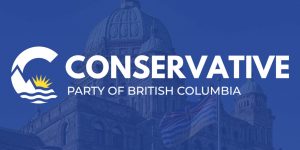 The BC NDP’s Dave Dollars announcement came just two days after the Conservative Party of BC touted their Rustad Rebate that would eventually exempt up to $3000 per month in rent or mortgage payments from provincial taxation. Existing landowners and homeowners are no doubt salivating as it gives renters and potential buyers more money to spend on rent and houses thereby pushing up prices due to an existing supply shortage. Not to be outdone with populist policy announcements, the Conservatives just released their Powering BC energy plan that ironically demonstrates energy illiteracy while proposing to “build trust and energy literacy” in British Columbia. The document demonstrates a profound lack of understanding of energy production, transmission and storage in British Columbia and reads like it was written by 20-something year old staffers imported from Premier Danielle Smith’s Alberta team.
The BC NDP’s Dave Dollars announcement came just two days after the Conservative Party of BC touted their Rustad Rebate that would eventually exempt up to $3000 per month in rent or mortgage payments from provincial taxation. Existing landowners and homeowners are no doubt salivating as it gives renters and potential buyers more money to spend on rent and houses thereby pushing up prices due to an existing supply shortage. Not to be outdone with populist policy announcements, the Conservatives just released their Powering BC energy plan that ironically demonstrates energy illiteracy while proposing to “build trust and energy literacy” in British Columbia. The document demonstrates a profound lack of understanding of energy production, transmission and storage in British Columbia and reads like it was written by 20-something year old staffers imported from Premier Danielle Smith’s Alberta team.
 To top it off, the BC Greens, lost in an ecosocialist hinterland, issued a platform that virtue signals a pathway to economic collapse. Their bizarre approach to deal with British Columbia’s housing shortage is to rage on the “for-profit industry that financializes” it. I’m not sure how musing about Marxist doctrine that “justifies and predicts the emergence of a stateless and classless society without private property” is helpful in increasing housing supply.
To top it off, the BC Greens, lost in an ecosocialist hinterland, issued a platform that virtue signals a pathway to economic collapse. Their bizarre approach to deal with British Columbia’s housing shortage is to rage on the “for-profit industry that financializes” it. I’m not sure how musing about Marxist doctrine that “justifies and predicts the emergence of a stateless and classless society without private property” is helpful in increasing housing supply.
 No political party has offered a vision that would inspire you to vote for them. Rather, the BC NDP are spending most of their time telling voters why they should be afraid of John Rustad and the BC Conservatives. The BC Conservatives are spending most of their time announcing what NDP policies they would undo. And not a day goes by without a BC Conservative candidate or their Leader, being associated with one batshit crazy conspiracy theory or another. Meanwhile the BC Greens, under their last-one-turn-out-the-lights sanctimonious leadership and dysfunctional organizational capacity, remain lost in the wilderness as they seek too inspire a handful of activists on the far left of the political spectrum.
No political party has offered a vision that would inspire you to vote for them. Rather, the BC NDP are spending most of their time telling voters why they should be afraid of John Rustad and the BC Conservatives. The BC Conservatives are spending most of their time announcing what NDP policies they would undo. And not a day goes by without a BC Conservative candidate or their Leader, being associated with one batshit crazy conspiracy theory or another. Meanwhile the BC Greens, under their last-one-turn-out-the-lights sanctimonious leadership and dysfunctional organizational capacity, remain lost in the wilderness as they seek too inspire a handful of activists on the far left of the political spectrum.
Sadly, my prediction for this election is that the winner will be the non voter. I wouldn’t be surprised to see a very low voter turnout and even perhaps record high numbers of spoiled ballots.
With that said, I have always voted for the local candidate who I believe would best represent the riding I live in. In the last four BC Elections I voted for Ida Chong (BC Liberal in 2009), myself (BC Green) in 2013 and again in 2017, Murray Rankin (BC NDP) in 2020 and I will vote for Stephen Andrew (BC Conservatives) in 2024. The choice would be hard for me in a number of other ridings where I might be tempted to write None of the Above on my ballot or where there are two candidates I might have to decide between. Kootenay Central comes to mind in the latter case as I have enormous respect for both Nicole Charlwood (BC Greens) rand Brittny Anderson (BC NDP).
In case anyone is interested, below is a list of twelve candidates (focusing on Vancouver Island) that I would certainly vote for if I lived in their riding. In the spirit of non partisanship, I offer three BC Conservative candidates, three former BC United Candidates who are now running as independents and six NDP candidates. I could write long essays as to why I support each of these people, but I will simply link you to their candidate pages so you can read up on them yourselves. There are others who I know or have worked with in other ridings, but I didn’t want to skew the non-partisan nature of my list.
I have an easy choice in Oak Bay Gordon Head where my long time friend Stephen Andrew is on the ballot. Coincidentally, when I announced my decision to run with the BC Green Party in Oak Bay Gordon Head on September 20, 2012, I did so on Stephen Andrew’s CFAX 1070 radio show!
Here’s the list:
| George Anderson | Nanaimo-Lantzville | BC NDP | |
| Stephen Andrew | Oak Bay-Gordon Head | BC Conservatives | |
| Mike Bernier | Peace River South | Incumbent | Independent (formerly BC United) |
| Gavin Dew | Kelowna-Mission | BC Conservatives | |
| Stephanie Higginson | Ladysmith-Oceanside | BC NDP | |
| Karin Kirkpatrick | West Vancouver-Capilano | Incumbent | Independent (formerly BC United) |
| Grace Lore | Victoria-Beacon Hill | Incumbent | BC NDP |
| Sheila Malcolmson | Nanaimo-Gabriola Island | Incumbent | BC NDP |
| Ravi Parmar | Langford-Highlands | Incumbent | BC NDP |
| Lana Popham | Saanich South | Incumbent | BC NDP |
| Tom Shypitka | Kootenay-Rockies | Incumbent | Independent (formerly BC United) |
| John Wilson | Esquimalt-Colwood | BC Conservatives |
Global warming: An intergenerational conversation and plea for action
In February I penned an article arguing that fear-based climate messaging often drives people to despondency and apathy rather than climate action. In this post, I’d like to offer a counter example of how positive, thoughtful climate messaging can inspire people to want to do better. I am grateful to the students and teachers at St. Margaret’s school, Minister George Heyman and the students in my EOS 365 (Climate and Society) class for participating and contributing to an intergenerational conversation on climate change on Monday, March 4, 2024.
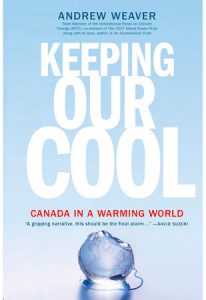 EOS 365 (Climate and Society) is a course I developed at UVic and first offered in 2009. The lectures follow the chapters in the book Keeping Our Cool: Canada in a Warming World that I first published in 2008. In the course I survey the climate system and its interaction with past, present, and future societies, including the onset of agriculture/domestication of animals in the Holocene, the rise and fall of early civilizations, the Anthropocene and global warming. Early in the course I teach a module on science communication. I emphasize that if one wants to advance lasting climate solutions, then one must bring people with you rather than alienating those who may not wish to prioritize climate action. I point out that politicians are elected to represent everyone, not just their support base, and so policy makers need to listen and respond to the views of all stakeholders.
EOS 365 (Climate and Society) is a course I developed at UVic and first offered in 2009. The lectures follow the chapters in the book Keeping Our Cool: Canada in a Warming World that I first published in 2008. In the course I survey the climate system and its interaction with past, present, and future societies, including the onset of agriculture/domestication of animals in the Holocene, the rise and fall of early civilizations, the Anthropocene and global warming. Early in the course I teach a module on science communication. I emphasize that if one wants to advance lasting climate solutions, then one must bring people with you rather than alienating those who may not wish to prioritize climate action. I point out that politicians are elected to represent everyone, not just their support base, and so policy makers need to listen and respond to the views of all stakeholders.
I also suggest to the students that whether or not society wants to deal with global warming really boils down to one question:
Do we the present generation owe anything to future generations in terms of the quality of the environment we leave behind. Yes? or No?
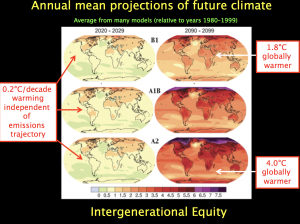 Science can’t answer that question. But science tells us why this is ultimately the question that needs to be asked. If the answer is yes, then we have no choice but to immediately take steps to decarbonize energy systems for the consequences of unchecked emission growth are profound (widespread species extinction and unparalleled geopolitical instability). If the answer is no, then who cares about global warming?
Science can’t answer that question. But science tells us why this is ultimately the question that needs to be asked. If the answer is yes, then we have no choice but to immediately take steps to decarbonize energy systems for the consequences of unchecked emission growth are profound (widespread species extinction and unparalleled geopolitical instability). If the answer is no, then who cares about global warming?
In class I also note that formulating climate policy is often inconsistent with a four year political cycle as the effects of the policy decisions made today will not be felt in the political lifetime of those making the decisions. Yet these same politicians will not be around in the future to be held accountable for the decisions they did or did not make. And so policies with demonstrable short-term outcomes often take precedence over climate policy. Allocating resources to advance short term “wins” will allow you to point to your political successes in a few years and proclaim “I was responsive to your needs; please re-elect me and I will do more”. It’s next to impossible to do the same with climate policy. But I would argue that there is a moral and ethical imperative to advance climate solutions now if society believes in the importance of intergenerational equity.
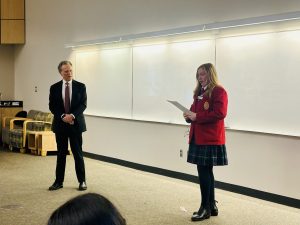 Building on the themes of effective climate communication and intergenerational equity, I hosted an event in EOS 365 on March 4 inspired by the Grade 7 (and 8) students at St. Margaret’s School, Victoria BC. Four generations were involved in the conversation: 1) the St. Margaret’s students; 2) the UVic students; 3) the teachers from St. Margaret’s; 4) the Honourable George Heyman (Minister of Environment and Climate Change Strategy) and me.
Building on the themes of effective climate communication and intergenerational equity, I hosted an event in EOS 365 on March 4 inspired by the Grade 7 (and 8) students at St. Margaret’s School, Victoria BC. Four generations were involved in the conversation: 1) the St. Margaret’s students; 2) the UVic students; 3) the teachers from St. Margaret’s; 4) the Honourable George Heyman (Minister of Environment and Climate Change Strategy) and me.
On February 1 2024, I attended St. Margaret’s Grade 7 Environmental Summit and was blown away by the insight and creativity of the students. The Grade 7 class had been learning about the socioeconomic and environmental ramifications of global warming. Students took on the role of an affected party (e.g. firefighter, fisher, pilot, business owner etc.) and researched how global warming was going to affect them. I listened to numerous testimonies from the Grade 7 students who role-played their chosen characters and was taken aback by their insight and how effectively, and articulately they were able to communicate their stories.
The highlight of the event for me was was when the Grade 7/8 St. Margaret’s choir sang a rendition of an SOS from the kids in front of all those in attendance.
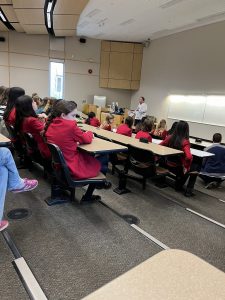 My March 4 class began with the St. Margaret’s grade 7/8 choir, led by Mike Keddy, setting the tone for the rest of our conversation by once more singing an SOS from the kids. At the end of the song, and as the final words “you can do better than this” were sung, Mike Keddy held up a Montreal Canadians pennant (indeed one can do better than that).
My March 4 class began with the St. Margaret’s grade 7/8 choir, led by Mike Keddy, setting the tone for the rest of our conversation by once more singing an SOS from the kids. At the end of the song, and as the final words “you can do better than this” were sung, Mike Keddy held up a Montreal Canadians pennant (indeed one can do better than that).
We were keeping things light and continuing the playful banter that had started at St. Margaret’s School when I noticed middle years teacher Michael Jones had decorated his classroom with some Edmonton Oilers swag. Michael arrived at my class wearing his Oilers jersey, while the TA for the class Katherine Martin proudly sported a Toronto Maple Leafs sweater. She was joined by middle years teacher and fellow Leaf’s fan Meaghan Thompson who showed up with a Leaf’s cap.
And of course, while noting the obvious irony, I adorned my Oilers jersey.
We were honoured to have Minister Heyman attend the class. He had just announced that he was not seeking reelection in the next provincial election moments before we started, and EOS 365 was his first public appearance following that announcement. Once the choir had finished, Minister Heyman spoke about CleanBC and how is government was responding to the challenge of global warming and capitalizing on the opportunity it provides for innovation and creativity in addressing the challenge.
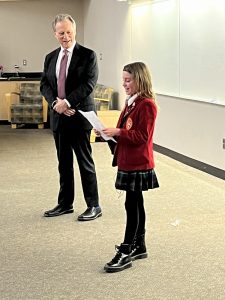 In advance of the class I had given six EOS 365 students copies of the scripts that were going to be read out (see the instagram reel at the end of this post). All six of these students were from the first cohort enrolled in UVic’s new BSc in Climate Science degree program. Each of these students asked the Minister a thoughtful yet probing question that they had prepared in advance and based on the script they were given. The Minister responded in an equally thoughtful way. I role-played the Speaker, and offered the class a supplementary question which was subsequently posed to the Minister. And so we proceeded to explore how the BC government was responding to climate change in six unique sectors.
In advance of the class I had given six EOS 365 students copies of the scripts that were going to be read out (see the instagram reel at the end of this post). All six of these students were from the first cohort enrolled in UVic’s new BSc in Climate Science degree program. Each of these students asked the Minister a thoughtful yet probing question that they had prepared in advance and based on the script they were given. The Minister responded in an equally thoughtful way. I role-played the Speaker, and offered the class a supplementary question which was subsequently posed to the Minister. And so we proceeded to explore how the BC government was responding to climate change in six unique sectors.
This particular class was perhaps the most enriching and rewarding experience I’ve ever had while teaching at the university level. And I started teaching in 1986! My sincere thanks to the students and teachers at St. Margaret’s School, the Minister and his staff, and the BSc in Climate Science and other students in EOS 365 for making this event so successful.
My hope in organizing this event was to demonstrate to my class how positive, hopeful, constructive and solutions-focused climate communication can inspire others to want to take climate action. Too often, activists use fear-based messaging, or outrageous acts of civil disobedience, like throwing soup on a priceless Van Gogh or disrupting traffic and creating chaos on local streets in an attempt to raise awareness as to the seriousness of climate change. As I have argued before, more often than not, such behaviour does little more than drive people to despondency and apathy rather than climate action.
View this post on Instagram
When ideology trumps evidence: The decision to cancel the school liaison officer program in School District 61
On May 31, 2023 and in what can only be described as a textbook example of ideological decision-based evidence-making, Trustees voted unanimously to cancel the school liaison officer (SLO) program in all School District 61 (SD61) schools (the only school district in BC to do so). The Vancouver School Board, which had previously eliminated school liaison officers in 2021, reinstated them in September 2023.
Remarkably, the SD61 decision was reached without consultation with any Police Board in the region or the leadership of either the Esquimalt or Songhees First Nations. In support of their decision, School Board Chair, and former BC Green candidate for Oak Bay-Gordon Head, Nicole Duncan demonstrated a fundamental misunderstanding of the role of SLOs and the community policing model (ironically in a community she wanted to represent in the BC Legislature) by stating “Police are being asked to fill in gaps in student support and to take on roles that should be filled by individuals with specialized expertise, such as youth and family counsellors and social workers“.
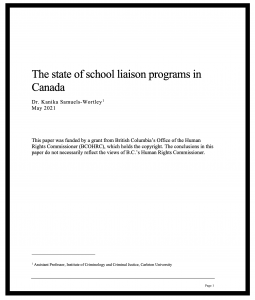 The SD61 decision built on a bizarre press release issued by the BC Office of the Human Rights Commissioner on November 22, 2022: Letter to school trustees on human rights concerns with the use of School Liaison Officers in B.C. schools. While obviously an overreach of the mandate of the unelected BC Human Rights Commissioner, she stated “I strongly recommend that all school districts end the use of SLOs until the impact of these programs can be established empirically. ” I was serving on the the Oak Bay Police Board at the time and was very familiar with Oak Bay’s community policing model and the important preventative role that school liaison officers play in such a model. I had hoped the Human Rights Commissioner letter was supported by extensive research on SLOs in BC Schools. Sadly, all that I could find was a single report commissioned by her office known as the Samuels-Wortley report.
The SD61 decision built on a bizarre press release issued by the BC Office of the Human Rights Commissioner on November 22, 2022: Letter to school trustees on human rights concerns with the use of School Liaison Officers in B.C. schools. While obviously an overreach of the mandate of the unelected BC Human Rights Commissioner, she stated “I strongly recommend that all school districts end the use of SLOs until the impact of these programs can be established empirically. ” I was serving on the the Oak Bay Police Board at the time and was very familiar with Oak Bay’s community policing model and the important preventative role that school liaison officers play in such a model. I had hoped the Human Rights Commissioner letter was supported by extensive research on SLOs in BC Schools. Sadly, all that I could find was a single report commissioned by her office known as the Samuels-Wortley report.
I thoroughly reviewed the Samuels-Wortley report. It provides a literature review of studies pertaining to SLO programs in Canada and the United States. First, it’s important to note that the author states on page 3 of her report “an extensive review of the literature reveals no peer-reviewed studies that explore the impacts of Canadian SLO programs on marginalized students.” In fact, one of the five peer-reviewed Canadian studies the author found pertaining to Canadian SLOs suggested positive outcomes when introduced as a component of a community policing model (Broll and Howells, 2019).
 The US-based research reviewed in the Samuels-Wrotley report focussed on the “school-to-prison” pipeline, violence, US-based SLO training protocol etc. and cannot be generalized to Canada. Even the Toronto Police internal evaluation reviewed in the Samuels-Wortley report is not generalizable to Greater Victoria as they were assessing a targetted SLO program introduced after the fatal shooting of a student at a Toronto high school, not as a key component of a community-policing framework.
The US-based research reviewed in the Samuels-Wrotley report focussed on the “school-to-prison” pipeline, violence, US-based SLO training protocol etc. and cannot be generalized to Canada. Even the Toronto Police internal evaluation reviewed in the Samuels-Wortley report is not generalizable to Greater Victoria as they were assessing a targetted SLO program introduced after the fatal shooting of a student at a Toronto high school, not as a key component of a community-policing framework.
The SD61 decision was also supported by a thoroughly debunked letter from the Greater Victoria Teacher’s Association who had apparently not surveyed their members before coming up with their supposedly (but clearly not) researched ideological position. On the other hand, the Victoria Principals’ and Vice Principals’ Association, whose members are in charge of individual school management wrote a strong letter of support for SLOs to the Board of Trustees that was apparently ignored.
What’s most odd about the GVTA letter is that in April 2018, when I was serving in the BC Legislature as the MLA for Oak Bay-Gordon Head, Victoria Police cut their SLO program after not being given the resources to maintain their frontline services. By December 2018, the Greater Victoria Teacher’s Association began a campaign to get police liaison officer’s back in Victoria Schools that continued into 2019 as school-based incidents started to rise. The GVTA’s dramatic policy lurch strikes me as a textbook example of what happens when one or two idealogues start ramming through their agenda while claiming to speak on behalf of the collective.
 Rather than choosing to consult with those delivering or providing oversight into the SLO program, School Board Trustees seemed to be swayed by those purporting to have uncovered gotcha evidence from FOI information they received. The egregious misinformation brought forward in this regard provided the “evidence” to support the ideological narrative needed to justify a predetermined decision (so-called decision-based evidence-making) to eliminate SLOs from SD61 schools. For example, on X (formerly known as Twitter), one activist offered gotcha ‘proof’ that VicPD were targeting members of the BIPOC community. They pointed out that 19% of all “youth suspects” arrested by VicPD were indigenous whereas only 5% of the population was indigenous. What they failed to point out was that the data they were looking at was aggregate rather than individual data. To illustrate this, suppose there were 100 arrests & one BIPOC individual committed 19 of them. Suppose the other 81 were committed by 81 different other folk. Then the statistic is only 1.2% of people VicPD labeled as “youth suspects” were BIPOC. Perhaps the activists would have served our community better if they educated themselves on the data before making incorrect assertions.
Rather than choosing to consult with those delivering or providing oversight into the SLO program, School Board Trustees seemed to be swayed by those purporting to have uncovered gotcha evidence from FOI information they received. The egregious misinformation brought forward in this regard provided the “evidence” to support the ideological narrative needed to justify a predetermined decision (so-called decision-based evidence-making) to eliminate SLOs from SD61 schools. For example, on X (formerly known as Twitter), one activist offered gotcha ‘proof’ that VicPD were targeting members of the BIPOC community. They pointed out that 19% of all “youth suspects” arrested by VicPD were indigenous whereas only 5% of the population was indigenous. What they failed to point out was that the data they were looking at was aggregate rather than individual data. To illustrate this, suppose there were 100 arrests & one BIPOC individual committed 19 of them. Suppose the other 81 were committed by 81 different other folk. Then the statistic is only 1.2% of people VicPD labeled as “youth suspects” were BIPOC. Perhaps the activists would have served our community better if they educated themselves on the data before making incorrect assertions.
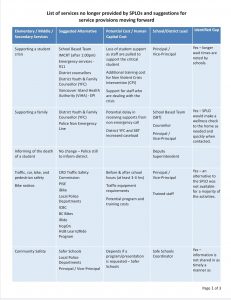 In another example, a powerpoint presentation to a School District committee on SLOs seemed to have been particularly influential even though none of the purported “gotcha” statistics were checked with VicPD and most were misinterpreted. Sadly with gangs now having increased access to schools, vulnerable youth become easy victims for grooming into gang life. But that’s not the only consequence of the irresponsible School Board decision. Here’s an incomplete list of what the Board has identified as services the SLOs used to provide that now fall into the responsibility of already overburdened principals and vice-principals, along with the District’s lone Safe Schools Coordinator. This list also illustrates the challenges faced by schools and students since the removal of the SLOs.
In another example, a powerpoint presentation to a School District committee on SLOs seemed to have been particularly influential even though none of the purported “gotcha” statistics were checked with VicPD and most were misinterpreted. Sadly with gangs now having increased access to schools, vulnerable youth become easy victims for grooming into gang life. But that’s not the only consequence of the irresponsible School Board decision. Here’s an incomplete list of what the Board has identified as services the SLOs used to provide that now fall into the responsibility of already overburdened principals and vice-principals, along with the District’s lone Safe Schools Coordinator. This list also illustrates the challenges faced by schools and students since the removal of the SLOs.
• Longer wait times accessing crisis support for students.
• Loss of student support as staff are pulled to support the critical student.
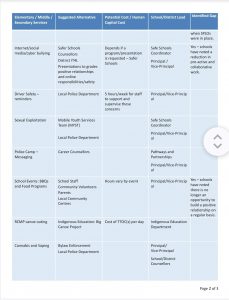 • Additional training cost for Non-Violent Crisis Intervention (CPI).
• Additional training cost for Non-Violent Crisis Intervention (CPI).
• Support for staff dealing with the crisis.
• Delays in receiving supports from police departments nonemergency calls.
• District Youth and Family Counsellor (YFC) and School-Based-Team (SBT) increased caseload.
• Alternatives are not available for a majority of activities.
• Additional program, training, and equipment costs.
• Information around community safety is not being shared in a timely manner.
• Reduction in pro-active and collaborative work around internet/social/media/cyber bullying.
• No longer an opportunity to build a positive relationship on a regular basis.
• Increase in vandalism and graffiti on school grounds.
• Students no longer have an opportunity to learn through a police focused lens.
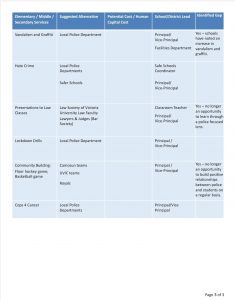 • There is no longer an opportunity to build positive relationships between police and students on a regular basis.
• There is no longer an opportunity to build positive relationships between police and students on a regular basis.
The following programs or presentations are missing from this list that the District provided:
• Gangs in (BC)
• Personal Safety
• Female Personal Safety
• Halloween Safety
• Healthy/unhealthy Relationships
• Human Trafficking
• LGBTQ Presentations
• PARTY program
• Property & Vehicle Crime
• Shoplifting
• Stranger Danger
• Street Drugs
• WITS program
• Mentor individual students
While at present, the Board of Education is certainly within its right to ban SLOs from their schools, community safety falls within provincial and local government jurisdiction. My hope is that the province will step in to rectify what has happened in SD61 through the introduction of legislation or regulation to ensure that such ill informed decisions cannot occur in the future without either provincial approval or consultation with the affected police boards (charged with oversight of policing). Nobody’s interests are served when our collective safety is undermined by poorly thought through decisions that are grounded in nothing more than ideology and virtue signalling.
I wish to offer my sincere thanks to all police officers in our region for their continued service to our community. I can only imagine how decisions like this, based on nonsensical rhetoric and misleading information, affect your morale. Yet the same activists undermining our region’s policing would almost certainly be the first ones to call for your help when a problem arises. Finally, I can’t imagine how police officers feel as they go to pick their children up at school while dressed in uniform knowing that new school district policy requires schools to log when officers are on school property.
Shame on the Greater Victoria School Board.

